Here is a sample of abstracts from the clinical research conducted at the NIH Clinical Center and published in a peer reviewed medical journal in 2023. Links to the full text and video formats are provided if available.
2023
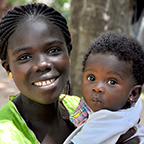
What works in engaging communities? Prioritizing nutrition interventions in Burkina Faso, Ghana and South Africa
Published in: PLOS One (December 2023)
Community engagement is a key strategy to improve maternal and child nutrition. Researchers adapted and evaluated the effectiveness of a board game-like community engagement tool known as “Choosing All Together” (CHAT) to involve communities and prioritize nutrition interventions in Burkina Faso, Ghana and South Africa.
Read the article.
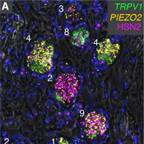
Expression pattern analysis and characterization of the hereditary sensory and autonomic neuropathy 2 A (HSAN2A) gene with no lysine kinase (WNK1) in human dorsal root ganglion
Published in: Experimental Neurology (December 2023)
Researchers in the Department of Perioperative Medicine investigated a rare gene mutation coding for an enzyme that, when defective, causes pain insensitivity. Expression of the gene in primary sensory neurons is hypothesized to be a key factor for the insensitivity problem. The photomicrograph shows gene localization in sensory neurons visualized with multiplex in situ hybridization.
Read the article.

Pediatric Research Without Parental Permission
Published in: The Journal of Pediatrics (December 2023)
Parental permission is required to enroll minors in research. Yet, this requirement can undermine valuable research. This study examines how review boards need to determine when minors may be enrolled without parental permission, and what other measures should be implemented to protect them.
Read the article.

Associations Between White Matter Integrity and Postural Control in Adults with Traumatic Brain Injury
Published in: PLoS One (November 2023)
A new study reveals the impact of traumatic brain injury on balance and control of posture, demonstrated by disruptions to the integrity of white matter, the network of nerve fibers that enables communication between different areas of the brain.
Read the article.

Continuing Trial Responsibilities for Implantable Neural Devices
Published in: JAMA Neurology (October 2023)
Implantable neural devices can offer relief for some treatment-resistant patients with significant disease burden. After the trial ends, patients who keep the experimental implant may need specialized care, hardware replacements, and software updates or else risk worse outcomes (i.e. losing device function, rebound symptoms, exposure to increased risks). The authors offer points to consider for professionals and organizations involved in neural implant trials to address important unmet posttrial needs.
Read the article.

Psychedelic Science, Contemplative Practices, and Indigenous and Other Traditional Knowledge Systems: Towards Integrative Community-Based Approaches in Global Health
Published in: Journal of Psychoactive Drugs (October 2023)
Mental health conditions are the second leading cause of non-fatal disease. This paper reviews psychedelic science, contemplative practices, and Indigenous and other traditional knowledge systems to suggest that combining them in integrative models of care through community-based approaches with an accountable health system, could prove transformative for health care.
Read the article.

Artificial Intelligence and Infectious Disease Imaging
Published in: The Journal of Infectious Disease (October 2023)
Noting the promise of artificial intelligence to accelerate research and improve clinical care, researchers assessed AI techniques used in infectious disease imaging research, highlighting unique challenges and rapidly developing solutions.
Read the article.

Feasibility of Using the Privacy-preserving Large Language Model Vicuna for Labeling Radiology Reports
Published in: Radiology (October 2023)
A Large Language Model (LLM) is a deep learning algorithm or artificial intelligence that can perform a variety of natural language processing tasks. Scientists are researching the feasibility of using a LLM to analyze and label data while protecting patient confidentiality.
Read the article.
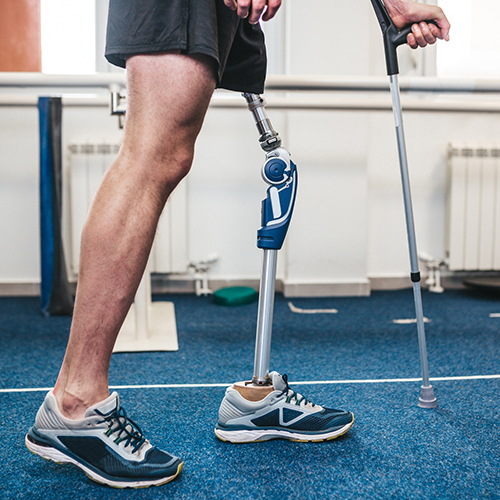
Analgesia After Dorsal Root Ganglionic Injection Under CT-Guidance in a Patient with Intractable Phantom Limb Pain
Published in: Pain Medicine (September 2023)
While controlling phantom limb pain is exceedingly difficult, blocking abnormal activity of sensory ganglion neurons offers a new approach, scientists report. In a study, researchers injected lidocaine, a local anesthetic, into the sensory ganglion to block pain signals from a patient’s previously amputated “phantom” leg. They say the procedure is now being modified to obtain long-duration pain control.
Read the article.
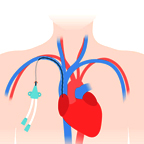
Prevention of Central Line–Associated Bloodstream Infections
Published in: The New England Journal of Medicine (September 2023)
Central lines provide reliable vascular access, however they are associated with a risk of central line–associated bloodstream infection (CLABSI) and may increase antibiotic exposure and the risk of death. With the rise in incidence of CLABSI during the COVID-19 pandemic, this review reveals vulnerabilities in some infection-prevention strategies and highlights others that are more resilient.
Read the article.
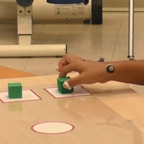
Children With Bilateral Cerebral Palsy Exhibit Bimanual Asymmetric Motor Deficits and EEG Evidence of Dominant Sensorimotor Hemisphere Overreliance During Reaching
Published in: Neurorehabil Neural Repair (August 2023)
Scientists conducted the first electroencephalography (EEG) evaluation of children’s reaching behavior exclusively conducted on patients with bilateral cerebral palsy (where both sides of the patient’s body are affected). This group demonstrated bimanual motor deficits with slower reaches and stronger hand preference than in the control group.
Read the article.
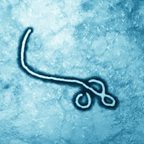
Clinical and immunological correlates of vasodilatory shock among Ebola virus infected nonhuman primates in a critical care models
Published in: The Journal of Infectious Diseases (August 2023)
The Ebola virus (EBOV) has led to increased outbreaks over the past decade. Using a nonhuman primate critical care model, two rhesus macaques were studied to better understand how the Ebola virus infection affects the body, focusing on shock and immune responses. Researchers concluded that the Ebola infection caused severe shock and organ dysfunction, along with changes in immune cell types and functions.
Read the article.

Distinguishing "Reasonable Accommodation" From Physical Assistance in Aid-in-Dying
Published in: American Journal of Bioethics (August 2023)
The authors highlight how aid-in-dying (AID) laws exclude terminal patients with motor impairments, leading them to endure progression of disease or opt for AID earlier than desired. In this commentary, they propose solutions that do not require changing the law.
Read the article.

Responding to the Call to Meaningfully Assess Institutional Review Board Effectiveness
Published in: JAMA Network Open (July 2023)
In an opinion piece, the authors respond to a February 2023 GAO report on privately owned institutional review boards (IRBs). They address the difficult task of creating a stakeholder-driven, evidence-based approach to assessing IRB effectiveness beyond regulatory compliance.
Read the article.
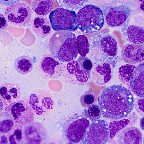
Use of flow cytometric light scattering to recognize the characteristic vacuolated marrow cells in VEXAS syndrome
Published in: Blood Advances (July 2023)
Scientists report a simple strategy using laser-based flow cytometric analysis to recognize white and red blood cell precursors in bone marrows of VEXAS patients with likely small cavities (vacuoles) characteristic of the systemic autoinflammatory disease. These results provide a potential diagnostic signal and basis to separate mutated cells, which may aid related functional and biochemical studies of the disease.
Read the article.
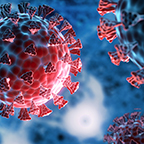
Outcomes Among Patients Hospitalized with Non–COVID-19 Conditions Before and During the COVID-19 Pandemic in Alberta and Ontario, Canada
Published in: JAMA Network Open (July 2023)
NIH CC and Canadian investigators examined hospital overcrowding during the COVID-19 pandemic and the effect it had on patients that didn’t have COVID-19 but needed the same resources in Canadian hospitals. The study suggests that non-ICU hospital care in Alberta and Ontario was resilient during COVID-19 caseload surges.
Read the article.
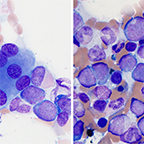
How I diagnose myeloid neoplasms with germline predisposition
Published in: American Journal of Clinical Pathology (July 2023)
Blood cancers caused by inherited genetic mutations and known as hematologic neoplasms with germline predisposition are more common than previously thought. In four case studies, researchers show how they use the clinical history, bone marrow findings, cytogenetic and molecular studies to identify patients with an inherited genetic predisposition for blood cancers, aiding in disease management.
Read the article.
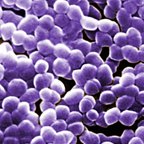
Predicting Infection Risk from Surveillance Cultures: Frustrating or Foretelling?
Published in: Lancet Infectious Diseases (June 2023)
In an invited commentary, two clinicians evaluate a recently published systematic review and meta-analysis of the cumulative incidence risk and infection rate of patients with multidrug-resistant Gram-negative bacteria or vancomycin-resistant enterococci colonization of the gastrointestinal or urinary tract. The implications to antibiotic therapy with broad-spectrum antibiotics are considered.
Read the article.
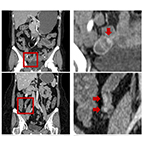
Improving segmentation and detection of lesions in CT scans using intensity distribution supervision
Published in: Computerized Medical Imaging and Graphics (June 2023)
Researchers have developed a new approach to train medical imaging networks to more accurately identify and isolate diseased and damaged tissue. The team used a probability function and pixel intensity data from CT scans to better detect tumors or abnormal growths in the kidneys, small bowel, and lungs.
Read the article.

Psychedelics, Meaningfulness, and the "Proper Scope" of Medicine: Continuing the Conversation
Published in: Cambridge Quarterly of Healthcare Ethics (June 2023)
Psychedelics produce a variety of effects including significantly altered states of consciousness. Equally effective non-hallucinogenic analogs could someday become available. This article explores whether psychedelics that induce profound subjective experiences should remain the default treatment given ethical considerations like risk/benefit ratios, inclusivity, and the meaningfulness of the psychedelic experience.
Read the article.

Everyone Wants Access: It Comes with a Price
Published in: Critical Care Medicine (June 2023)
Central venous catheters provide safe and dependable vascular access for medical treatments but pose infection risks. Researchers studied electronic health records and found that increased catheter access correlated with higher infection rates. They suggest reducing access and using alternative routes for medication administration. However, practical challenges and risks must be considered. Rather than reducing use, medical teams must ensure proven infection prevention strategies are followed for each catheter insertion.
Read the article.
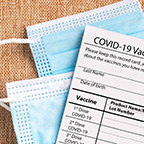
Association Between Vaccination Status and Outcomes in Patients Admitted to the ICU With COVID-19
Published in: Critical Care Medicine (May 2023)
Scientists compared outcomes of patients admitted to the ICU for SARS-CoV-2 infections in patients who had(vs had not) received a COVID-19 vaccination series. mortality risk remained similar between vaccinated and unvaccinated patients after the onset of critical illness, but booster doing was associated with increaed survivabulity from COVID-19 related critical illness.
Read the article.
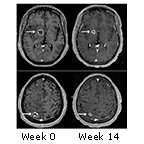
Persistence of Human Immunodeficiency Virus–Associated Cerebral Toxoplasmosis Lesions in Successfully Treated Patients Receiving Combination Antiretroviral Therapy
Published in: Open Forum Infectious Diseases (May 2023)
A recent study suggests that in people with HIV who have demonstrated immune reconstitution on anti-retroviral therapy, persistent brain lesions caused by the parasite Toxoplasma gondii may not require ongoing therapy after initial treatment is successful. Authors say the findings can help inform clinical decision-making for HIV-infected patients.
Read the article.

Administration of Bifidobacterium animalis subsp. lactis strain BB-12® in healthy children: characterization, functional composition, and metabolism of the gut microbiome
Published in: Frontiers in Microbiology (May 2023)
Researchers examined the impact of two vs. three strain-supplemented yogurt probiotics on healthy children's gut microbiome and metabolome. An increase in the administered probiotics was observed over the first ten days, indicating their impact on the gut microbiome.
Read the article.

Impact of nonpharmacological interventions on cognitive impairment in women with breast cancer: A systematic review and meta-analysis
Published in: Asia-Pacific Journal of Oncology Nursing (April 2023)
Scientists conducted a systematic review and meta-analysis of studies that include patients with cognitive disorders undergoing cancer treatment. Investigation found that nonpharmacological interventions can have a significant effect improving cognitive functioning within that demographic.
Read the article.
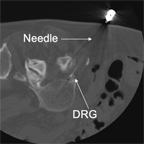
Analgesia After Dorsal Root Ganglionic Injection Under CT-guidance in a Patient with Intractable Phantom Limb Pain
Published in: Pain Medicine (March 2023)
Controlling phantom limb pain is exceedingly difficult. Researchers in the Department of Perioperative Medicine CC, and at Massachusetts General Hospital, showed that direct inhibition sensory ganglion neurons can block phantom limb pain, which it did. The X-ray shows the treatment needle being placed into one of three ganglia injected.
Read the article.
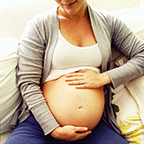
Beyond a Medicalized View of Reproduction: Recentering Pregnant People in the Ethics of Ectogenesis
Published in: The American Journal of Bioethics (March 2023)
In a commentary, the legal scholar and NIH post-doc responds to a recent paper framing the ethical considerations of artificial womb technology and fetal extraction, noting that the paper’s authors take a highly medicalized view of reproduction that favors the interests of the fetus and excludes those of pregnant mothers.
Read the article.

Micronutrient Supplementation and Bone Health After Prophylactic Total Gastrectomy in Patients with CDH1 Variants
Published in: The Journal of Clinical Endocrinology & Metabolism (March 2023)
Prophylactic total gastrectomy, or complete removal of the stomach, is intended to reduce the risk of hereditary diffuse gastric cancer for people with germline variants in the CDH1 tumor suppressor gene. This study indicates that micronutrient supplementation and nutritional counseling is important to mitigate bone density loss after gastrectomy.
Read the article.

Fully-automated detection of small bowel carcinoid tumors in CT scans using deep learning
Published in: Medical Physics (March 2023)
Small bowel carcinoid tumor is a rare abnormal growth of tissue in the body that is becoming more common. Patients with this type of tumor often experience delays in diagnosis due to vague symptoms, slow growth of tumors, and lack of clinician awareness. This study explores the use of Computed tomography (CT) for diagnosis and detection of small bowel carcinoid tumor.
Read the article.
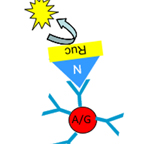
Advancing Luciferase-Based Antibody Immunoassays to Next-Generation Mix and Read Testing
Published in: Biosensors (Basel) (February 2023)
Researchers in the Department of Perioperative Medicine and the National Institute of Dental and Craniofacial Research developed a new method to measure antibodies in blood and body fluid. This review examines new variations on the basic method that can accelerate progress in understanding autoimmune disorders and infectious diseases. The signal is measured as a flash of light.
Read the article.

A Cross Sectional Survey of Recruitment Practices, Supports, and Perceived Roles for Unaffiliated and Non-scientist Members of IRBs
Published in: AJOB Empirical Bioethics (February 2023)
This study explore processes of recruitment, training, and the perceived roles for unaffiliated and non-scientist members of Institutional Review Boards.
Read the article.
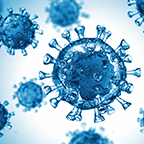
Vaccination Ameliorates Cellular Inflammatory Responses in SARS-cov-2 Breakthrough Infections
Published in: The Journal of Infectious Diseases (February 2023)
Researchers evaluated patients who had been vaccinated against SARS-CoV-2 and had breakthrough infections and compared them to unvaccinated patients infected with SARS-CoV-2. The study showed that vaccinations may help limit the progression of inflammatory responses associated with disease severity.
Read the article.

Spleen tyrosine kinase inhibition restores myeloid homeostasis in COVID-19
Published in: Science Advances (January 2023)
Testing of cellular therapy products for MA trademark of COVID-19 is acute respiratory distress syndrome and multisystem organ failure. This study tries to understand differences in the myeloid response among those who received fostamatinib, a Spleen tyrosine kinase (SYK) inhibitor, versus placebo for the treatment of hospitalized patients on oxygen.
Read the article.
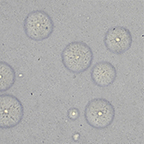
Comparison of Five Commercial Molecular Assays for Mycoplasma Testing of Cellular Therapy Products
Published in: Journal of Clinical Microbiology (January 2023)
Testing of cellular therapy products for Mycoplasma, a tiny, cell wall lacking bacteria, is a regulatory requirement by the FDA. This study analyzes five commercially available molecular assays to detect Mycoplasma and results showed the Biofire Mycoplasma assay performed best, while MycoSEQ and MycoTOOL assays performed similarly.
Read the article.
Read more articles about research in the NIH Clinical Center in 2023.

